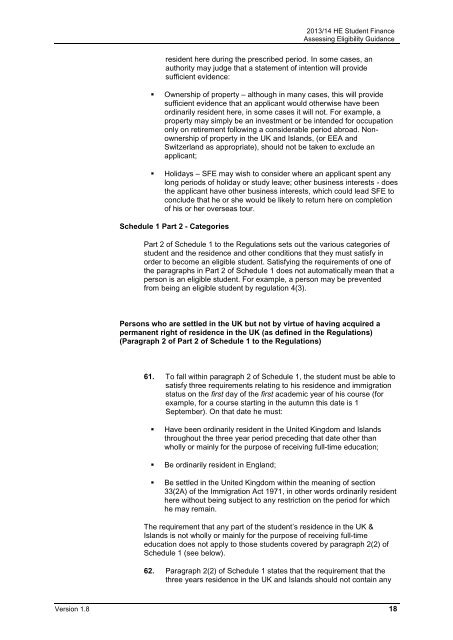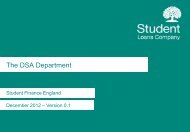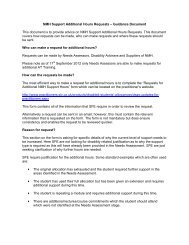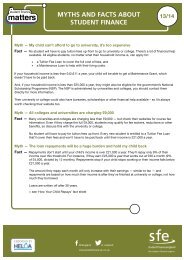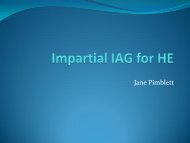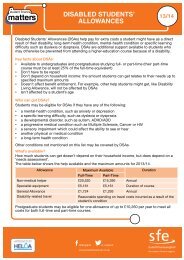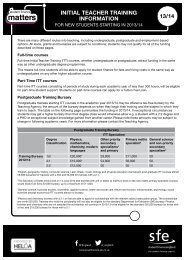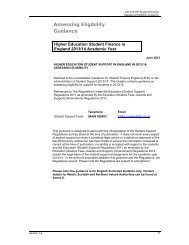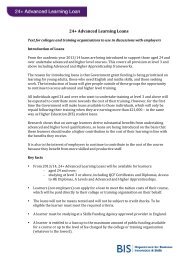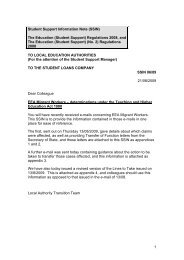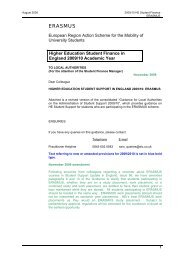SFE Assessing Eligibility Guidance 2013/14 - Practitioners - Student ...
SFE Assessing Eligibility Guidance 2013/14 - Practitioners - Student ...
SFE Assessing Eligibility Guidance 2013/14 - Practitioners - Student ...
Create successful ePaper yourself
Turn your PDF publications into a flip-book with our unique Google optimized e-Paper software.
<strong>2013</strong>/<strong>14</strong> HE <strong>Student</strong> Finance<br />
<strong>Assessing</strong> <strong>Eligibility</strong> <strong>Guidance</strong><br />
resident here during the prescribed period. In some cases, an<br />
authority may judge that a statement of intention will provide<br />
sufficient evidence:<br />
• Ownership of property – although in many cases, this will provide<br />
sufficient evidence that an applicant would otherwise have been<br />
ordinarily resident here, in some cases it will not. For example, a<br />
property may simply be an investment or be intended for occupation<br />
only on retirement following a considerable period abroad. Nonownership<br />
of property in the UK and Islands, (or EEA and<br />
Switzerland as appropriate), should not be taken to exclude an<br />
applicant;<br />
• Holidays – <strong>SFE</strong> may wish to consider where an applicant spent any<br />
long periods of holiday or study leave; other business interests - does<br />
the applicant have other business interests, which could lead <strong>SFE</strong> to<br />
conclude that he or she would be likely to return here on completion<br />
of his or her overseas tour.<br />
Schedule 1 Part 2 - Categories<br />
Part 2 of Schedule 1 to the Regulations sets out the various categories of<br />
student and the residence and other conditions that they must satisfy in<br />
order to become an eligible student. Satisfying the requirements of one of<br />
the paragraphs in Part 2 of Schedule 1 does not automatically mean that a<br />
person is an eligible student. For example, a person may be prevented<br />
from being an eligible student by regulation 4(3).<br />
Persons who are settled in the UK but not by virtue of having acquired a<br />
permanent right of residence in the UK (as defined in the Regulations)<br />
(Paragraph 2 of Part 2 of Schedule 1 to the Regulations)<br />
61. To fall within paragraph 2 of Schedule 1, the student must be able to<br />
satisfy three requirements relating to his residence and immigration<br />
status on the first day of the first academic year of his course (for<br />
example, for a course starting in the autumn this date is 1<br />
September). On that date he must:<br />
• Have been ordinarily resident in the United Kingdom and Islands<br />
throughout the three year period preceding that date other than<br />
wholly or mainly for the purpose of receiving full-time education;<br />
• Be ordinarily resident in England;<br />
• Be settled in the United Kingdom within the meaning of section<br />
33(2A) of the Immigration Act 1971, in other words ordinarily resident<br />
here without being subject to any restriction on the period for which<br />
he may remain.<br />
The requirement that any part of the student‟s residence in the UK &<br />
Islands is not wholly or mainly for the purpose of receiving full-time<br />
education does not apply to those students covered by paragraph 2(2) of<br />
Schedule 1 (see below).<br />
62. Paragraph 2(2) of Schedule 1 states that the requirement that the<br />
three years residence in the UK and Islands should not contain any<br />
Version 1.8 18


